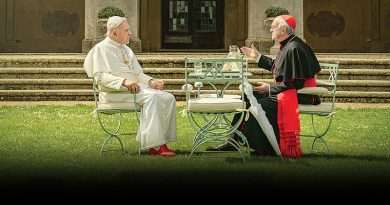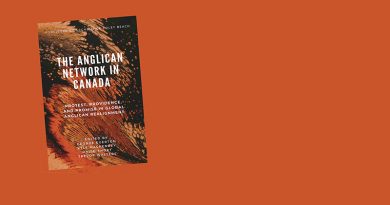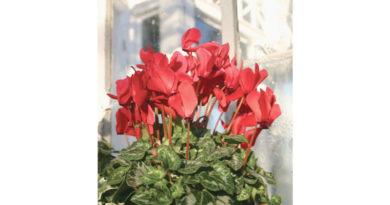Winter Reads
Curl up with a mug of cider or hot chocolate and enjoy some of these new titles, which our West Coast reviewers recommend.
Bill Reimer is the manager, and has been for many years, of the Regent College Bookstore, one of North America’s largest surviving theological bookstores. He attends St John’s Vancouver.
May We be Spared to Meet on Earth: Letters of the Lost Franklin Arctic Expedition
Ed. by Russell A. Potter, Regina Koellner, Peter Carney, and Mary Williamson
McGill-Queen’s University Press, 2022
The discovery in 2014 and 2018 of the two largely intact and sunken ships, Erebus and Terror, of the lost John Franklin Arctic expedition of 1845, has once again stirred up worldwide interest in the tragic voyage that eventually claimed the lives of all 129 sailors that had set out from England. This new collection brings together, from far flung archives, 173 letters from the crew (plus an additional 21 letters from the family to the “lost”) that were sent from the beginning of the voyage until the last handoff when the ships were off the coast of Greenland. My immediate motivation in reading the collection was to gain a window into the religious lives of this disparate group of British sailors as well as to learn more of the mystique surrounding a tragic but heroic event that ended in what became Canadian waters.
Many of the letters were from Sir John Franklin himself, written to his family and friends. Franklin comes across as a devout, evangelical Christian who led Sunday morning services on the main deck for the crew and then in the evening an additional service in his cabin for those who wished or were on watch in the morning. The letters of the crew routinely speak highly of Franklin and comment positively on his sermons. One sailor wrote to his parents that Franklin “gives sermons out of his sermon books & I can assure you – adds a great deal himself – They say they would sooner hear him than half the parsons in England.”
The two ships became hopelessly jammed in the ice off King William Island with Franklin succumbing to death on June 11, 1847, as listed in a document later found in a cairn. This is the only known date of death of anyone in the expedition, but it is thought that all the crew were dead by 1850. There remains the possibility of finding further artifacts from the voyage and even preserved documents, through continued exploration of the two wrecks. This is perhaps a book to be checked out from a public library where one can find other recent writings on the fated voyage.
An Immense World: How Animal Senses Reveal the Hidden Realms Around Us
Ed Yong
Random House, 2022
Pulitzer Award-winning author Ed Yong invites the reader into a world, as perceived by animal senses, a world that is filled with wonder. We are asked to imagine a school gymnasium in which there is an elephant, mouse, robin, owl, bat, mosquito, rattlesnake, bumblebee and a woman named Rebecca. How might this “imaginary menagerie” perceive the other? Each creature has a “sensory bubble.” Take the sense of smell: the elephant would not smell anything, but the rattlesnake would smell the trail of the mouse and the mosquito could “smell” the alluring CO2 on Rebecca’s breath and skin. The robin can feel the magnetic field of the earth and guided by an internal compass can escape the gym through an open window…and so on.
For Yong, animals are not machines but rather “sentient entities” and the inner world of humans is not to be exalted over that of other species. Several years ago, the philosopher Thomas Nagel asked the question, “What is it like to be a bat?” Nagel points to the obvious that in answering this the human is restricted to the resources of the mind. These resources include vision and language. Yong then takes us on a marvellous tour of the animal senses through light and the endless ways of seeing, colour, pain heat, vibrations, sound, echoes, electric fields (350 species of fish can produce their own electricity) and on to magnetic fields.
We are reminded of the ways that by gaining knowledge of this world, humans have remolded it. While we can measure the distance that the sound of a blue whale can travel, humans have defiled the waters that they inhabit. Yet there remain signs of hope for the natural world. Through curiosity and imagination, we can step into the world of nature realizing that this “choice is a gift” and not a “blessing we have earned.” This sense of wonder is the closest that Yong ventures to viewing what surrounds us as Creation.
Biblical Critical Theory: How the Bible’s Unfolding Story Makes Sense of Modern Life and Culture
Christopher Watkin
Zondervan, 2022
Written by an Australian scholar trained in literary criticism, this is an accessible handbook written for the Christian who wishes to understand the culture in which all of us are embedded. “Figures,” as used by Watkin, are all those patterns that shape us: 1) Language, ideas and stories; 2) Time and space; 3) Structure of reality; 4. Behaviour that is expressed within our culture; 5. Relationships that we experience with friends, family, strangers, the media and institutions; 6) Objects in our lives that range from the cars we drive to the smartphones that we use. These figures are us. Over the past two thousand years Christianity has been imprinted on our culture even if Christian teaching is now largely unknown. Culture and Christianity is entangled and there is no easy separation.
The figures of the culture and the figures of the Bible are explored through a process that Watkin calls “diagonalization.” By this a radical intervention is proposed whereby, for example, the Absolute-Personal dichotomy is shown to be false and is overcome by an “Absolute personality theism” as revealed in the biblical account. Likewise, taking an example from the biblical witness, the seemingly at odds books of Proverbs and Ecclesiastes are brought together by a diagonalization that introduces the message of Job into the mix. When these three books are “woven together” they provide “a rich, complex and existentially authentic view of the world.”
The Incarnation is the ultimate diagonalization, going against the ahistorical assumptions of modern thought, when the “Word became flesh” and entered into human “calendar history.” Extensive diagrams bring clarity to at times difficult concepts. Watkin’s book is enthusiastically endorsed by Tim Keller.
Julie Lane Gay is a writer and editor who lives in Vancouver. She and her husband, Craig, attend St John’s, Vancouver where they also teach catechism.
The Life We’re Looking For: Reclaiming Relationship in a Technological World
Andy Crouch
Convergent Books, 2022
Making sense of ourselves in our culture is perplexing. Why is it so many of us feel lonely, and why is it that even as we feel more like an account number than a human, articulating what’s creating these experiences remains fuzzy? We talk about impersonal-ness and mental health and polarization but how do we address these as a whole, and more importantly, as Christians?
The Life We’re Looking For is an excellent place to start.
Andy Crouch, a social critic and business leader, wisely looks first at our longing to be recognized and known, and then dives into the ubiquitous ways we have sabotaged ourselves. He asks, “Is it any coincidence, or just a kind of grand irony, that loneliness has spiked just as our media has become ‘social,’ our technology became ‘personal,’ and our machines learned to recognize our faces?”
Crouch unpacks what we have lost as we have become “embedded in a world of money, machines and devices.” He reminds us that “while nothing can truly take away our personhood, only another person can fully give it back to us.”
It turns out it is not just our devices that are robbing us of so much, but money. Crouch writes, “Money, for Jesus was not just a neutral tool but something that could master a person every bit as completely as the true God.”
Crouch concludes with what he calls “redemptive moves,” ways we can live more fully personal lives, ways we can “begin to extend the recognition of personhood to those most in danger of being overlooked.” While these moves aren’t easy or quick, Crouch articulates them in ways that are thoroughly scriptural, showing us the value of that which blesses over that which is pragmatic.
The Year of the Puppy: How Dogs Become Themselves
Alexandra Horowitz
Viking, 2022
As the natural world – the ocean, the trees, the fragrant shrubs – continues to show me not just God’s creativity but his brilliance, so do animals. I resisted getting a “Covid puppy,” but I understand why others jumped at the chance. Dogs can be an adventure, an effusive recipient of our affections.
While this is the perfect Christmas gift for the puppy owner, my guess is almost any curious reader will find the science memoir, The Year of the Puppy, fascinating. A psychologist and director of the Dog Cognition Lab at Barnard College in New York City, author Alexandra Horowitz is knowledgeable and practical. Chronicling her first year with Quid (short for Quiddity), a sweet bundle of unknown breed with black, gold and white fur, she’s also honest. It turns out that it’s no easier to housetrain a puppy when you are an expert; you just know slightly more of what’s going on.
Horowitz explains puppy sleeping habits (that’s when the growth happens so a sleeping dog is often a smarter one) and training possibilities. She verifies that there is nothing uniquely appealing about the shoes or homework that get chewed up – you just left them at mouth level. It’s their locale not their scent that’s pertinent.
Horowitz also explains what’s going on with us. She concludes, “we didn’t just adopt a dog; we took on her education into everything human.”
A Widower’s Lament: The Pious Meditations of Johann Christoph Oelhafen
Ronald K. Rittgers
Fortress Press, 2021
Several close friends have lost spouses and children in the last few years, and I’ve learned a lot about grief. So far, I know it’s awful, and different for everyone.
To find my bearings (and hopefully become a better sister in Christ), I’ve turned to grief memoirs. While most are more recent (A Grief Observed, God in the Dark, A Hole in the World), one that has particularly blessed me is a journal written in 1619 by Johann Christoph Oelhafen, a legal official who loses his wife of eighteen years and the mother of his eight children–and perhaps most importantly, his dearest friend. It’s a journal of reflections and poetry (even several acrostics); one of my favorite entries reads like a psalm, an attempt to encourage himself.
He knows what is needful for each person,
death or life;
believe this always, firmly and free from care.
Give over to him all crosses and concerns.
If someone takes away even a hair on your head in this life,
it is in accordance with his will.
So place your hope and trust in him.
Johann wrote to God – not to convince anyone of the depths of his despair nor of his surviving faith in Christ. His insight into his broken heart, his sin, and God’s great and personal love for him are exceptional. It’s wonderful to read of such deep faith.
Church historian Ron Ritters, an expert in Luther and the Protestant Reformation, discovered Johann’s journal buried in the archives of a German museum. He prefaces the journal with an excellent introduction, explaining not only its historical significance but its theological and pastoral value. And while at times the writing feels antiquated, Johann’s heartache, honesty and pleas for understanding sound eerily similar to that of my friends. TAP




